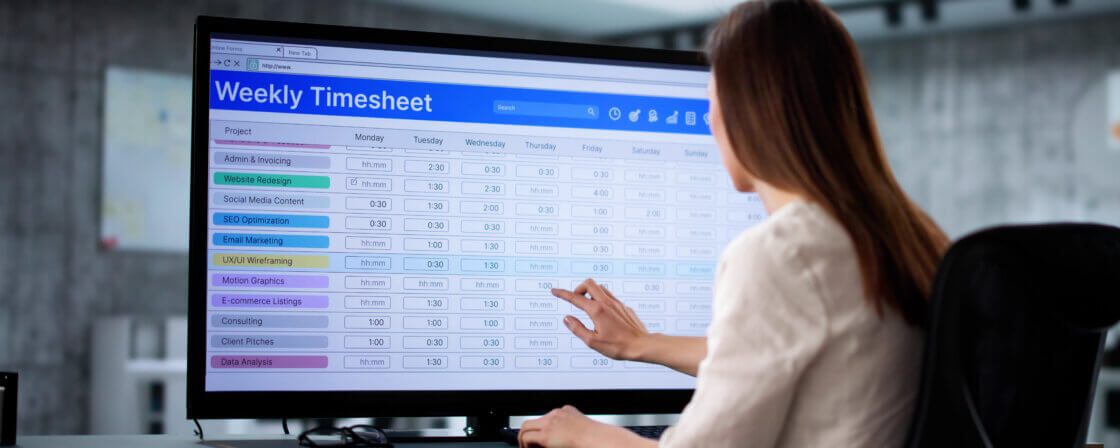Time records vs. attendance records
The first and most common misconception stems from the confusion between the two terms: attendance and working time.
Attendance records only track when an employee came in and when they left. Typically, it is provided by turnstiles, smart cards or simple paper slips at the entrance. Attendance is therefore more of a technical record of presence.
In contrast,the recording of working time is precisely defined by the Labour Code. It must include not only the start and end of the shift, but also breaks, overtime, night work, on-call time or work on public holidays. It is therefore not enough to know that an employee was ‘in the office from nine to five’. It should also be recorded that, for example, he took a lunch break from 12:00 to 12:30 and worked overtime from 17:00 to 19:00.
This distinction is crucial because attendance records are voluntary and have only organisational significance, whereas working time records are compulsory and subject to control by the public authorities.
Are you solving a similar problem?
Need some advice?
Properly keeping time records is key to avoiding fines and disputes with employees. If you are unsure whether your records comply with the legal requirements, please contact us.
More information
- When you order, you know what you will get and how much it will cost.
- We handle everything online or in person at one of our 6 offices.
- We handle 8 out of 10 requests within 2 working days.
- We have specialists for every field of law.
What are the employer’s obligations regarding the recording of working time?
The statutory basis for the recording of working time can be found in Section 96 of the Labour Code. The obligation to keep such records is non-transferable, meaning that the employer cannot transfer this obligation to the employee. Although they can provide assistance, the responsibility for accuracy and completeness always remains with the employer.
The records must include:
- the start and end of the working shift,
- the hours worked, including overtime,
- rest periods and breaks,
- night work,
- on-call time,
- working on rest days (public holidays).
The form of recording working time is not prescribed. You can keep an Excel spreadsheet, a paper diary or use a sophisticated electronic system. However, it is important that the records are conclusive and legible.
Another obligation is to keep records. This is not only for the labour inspectorate but also for payroll and social security purposes. It is generally recommended to keep records for at least 5 years, and for some data (e.g. for pension purposes) even longer.
Employees also have the right to inspect and make copies of the records. These copies are at their own expense, but the employer must allow them to make them.
What if someone does not keep time records?
The Labour Inspectorate considers working time records to be one of the most important areas it focuses on during inspections. This is logical, because wages, allowances and occupational health and safety depend on correct record-keeping.
If an employer does not keep records, keeps inadequate records or keeps distorted records, they risk heavy fines. The inspectorate can impose a penalty of up to CZK 400,000 for minor violations, and up to CZK 1,000,000 in the case of repeated or deliberate violations.
In addition to the financial consequences, there is also a reputational risk. If an employee is not paid overtime for a long period of time, for example, he or she may seek help from the courts. And in court proceedings, an employer who does not keep proper time records has a significantly more difficult position.
How to keep records of working time correctly
Although the law does not prescribe a specific form of keeping records of working time, in practice it is recommended that they should be clear – ideally in the form of tables kept for individual employees with the possibility of summarizing, for example in the form of monthly statements.
At the same time, there is a need for transparency, which means that the records should be audited and approved by the supervisor and that employees should have access to them.
Comprehensiveness is also important, i.e. recording all mandatory data, not only arrivals and departures, but also breaks, overtime, on-call or night shifts.
Last but not least, regularity plays a role. Records should be kept continuously and up-to-date, not retrospectively added to with the passage of time.
In practice, this may look like a daily record, for example:
1.3. 2025 – shift 9:00-17:00, break 12:30-13:00, overtime 17:00-18:30.
Such a record is understandable, auditable and will stand up to the inspectorate.
Modern technology can help with record keeping
Modern tools and technologies today make the keeping of working time records much easier. While manual records are easy to make mistakes with and time-consuming to process, electronic systems can automate most tasks – calculating shift length, breaks or overtime themselves. Moreover, all data is clearly organized and can be easily exported to reports, statistics or graphs, which will be appreciated not only by HR managers but also by the company management.
Another advantage is secure archiving, as the electronic records are stored digitally, so there is no risk of loss or damage. The ability to record time via a mobile app, terminal or online interface adds flexibility to the entire system and will be especially appreciated by employees who work away from the office. In addition, cloud-based time and attendance systems are now affordable even for smaller businesses and not only make it easy to demonstrate compliance with the law, but also to get a better overview of work efficiency.
Time attendance is therefore not a formality, but a legal obligation, the failure to comply with which can have serious consequences. It is not enough to keep attendance records; all aspects of working time must be recorded. Employers should see this obligation not only as a protection against fines but also as a tool for fair treatment of employees and prevention of labour disputes.
Summary
Recording working time is not a mere formality, but a legal obligation that protects both employers and employees, and failure to do so can lead to heavy fines or litigation. Unlike time and attendance records, which only track attendance at work, time and attendance records under the Labour Code must include the start and end of shifts, breaks, overtime, night work, on-call or holiday work. The employer is always responsible for keeping the records in a clear, conclusive and regularly updated form, and the records must be kept for inspection and social security purposes. If the records are missing or incomplete, penalties of up to one million crowns may be imposed and the employer has a difficult position in any litigation. Record-keeping can be ensured in various ways – from paper spreadsheets to simple Excel reports to modern electronic systems that can automate most tasks, archive data clearly and make it available to employees, even via a mobile app. Modern technologies not only make it easier to comply with legal requirements, but also provide greater insight into work efficiency and help prevent misunderstandings in labour relations.
Frequently Asked Questions
Do I have to keep records of working time for temporary workers?
Yes, the obligation also applies to employees under employment and performance agreements. The scope of registration is the same as for traditional employment relationships.
Is it enough to keep attendance via the chip system at the door?
It’s not enough. The attendance register only records attendance at work but does not contain all the mandatory data required by the Labour Code.
How long do I have to keep the records?
A minimum of 5 years is recommended, and 30 years for pension purposes.
Can I require employees to keep their own records?
The employer may require cooperation, but the responsibility for keeping and maintaining accurate records rests with the employer at all times.
What are the most common mistakes in record keeping?
Failure to record breaks, overtime or on-call time, backdating or complete confusion of attendance with time records.




